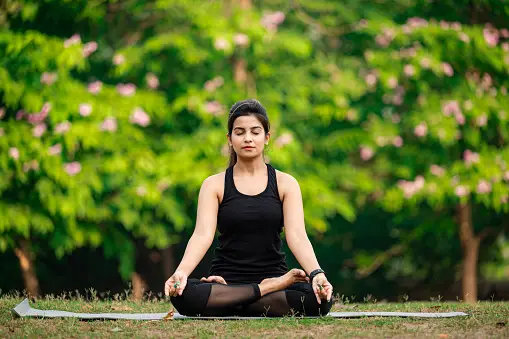Self-care, as the name implies means caring for yourself mentally, physically, emotionally, socially, and in all spheres of life. It’s all about taking steps that’ll help you relieve stress, stay healthy, lower the risk of illnesses and diseases, and stay energized always.
Are you ready to equip yourself with all you need to stay healthy on all sides? Take a seat and follow us on this journey to self-care.
In this blog post, we’ll delve into what self-care means, its benefits, types, and 13 self-care practices that can transform your well-being.
It’s time to prioritize your health and embark on the journey to a healthier and happier you.

Article Contents
What Exactly Is Self-Care?
Self-care, as defined by the World Health Organisation (WHO), encompasses a range of activities and practices that individuals engage in to promote their physical, mental, and emotional well-being with or without the support of a health worker. It’s the deliberate actions people make to maintain their health, prevent illnesses and diseases, and also manage existing health conditions.
Self-care practices are like paying attention to yourself and giving yourself the love, care, and attention that you need to stay physically and mentally fit. It’s about prioritizing your overall well-being and preventing diseases from creeping in.
Organizations like the World Health Organisation and the International Self-care Foundation emphasize the importance of self-care practices in keeping us healthy. Self-care management doesn’t mean you should rely on healthcare systems alone, it has a lot to do about taking charge of your own health.
Self-care includes eating balanced meals, exercising, getting enough sleep, and finding healthy ways to cope with daily stress.
Effective self-care management has also helped to deal with chronic conditions like heart failure. It helps to recognize the signs and symptoms of your condition early enough and regularly check yourself.
Self-care goes beyond the physical, it’s about taking care of your emotional health too.

To effectively practice self-care, you need to understand what your body needs. This is where health literacy comes into play. Health literacy means understanding your health and all you need to take proper care of it.
Types of Self-Care
Self-care is like taking care of yourself in different ways to stay healthy and feel good. Important groups like the World Health Organization and the International Self-care Foundation agree that self-care is crucial. It includes things you do to stay healthy, prevent sickness, and handle ongoing health issues.
There are different types of self-care, and they all help you stay healthy and happy.
Physical Self-Care
Physical self-care is the main type of self-care that lots of people prioritize. It’s the act of engaging yourself in activities that will promote your physical health and well-being. act of consciously engaging in activities that promote your physical health and well-being. It’s about taking care of your body to ensure it functions properly.
Your physical appearance has a lot to do with how people will relate well with you. So you need to care for yourself by engaging in regular exercises to keep your body fit. You should also eat balanced and nutritious meals and ensure you get at least 7 hours of sleep daily.
Physical self-care also requires you to visit your healthcare provider for regular checkups to stay abreast of any changes in your body.

Social Self-Care
Social self-care is a type of self-care that has to do with building healthy and loving relationships with people.
You can’t live your life alone. Even if you’re an introvert who loves to stay to yourself, you still need friends and families who you can communicate with frequently.
Social self-care emphasizes on seeking support from others if the need arises and fostering social connections. You can confide in trusted friends, family members, or therapists if you need someone to share your feelings with.
To practice social self-care, you need to spend quality time with your friends and family. You can also join social groups, volunteer for community services, and contribute to the growth and development of your society.
Mental Self-Care
Sometimes, we ignore this part of self-care and it is so important. Mental self-care is all about taking steps that help you stay mentally healthy. If you are not mentally stable, you can’t work effectively and efficiently.
Take time to practice mindfulness exercises that help to reduce stress and promote your emotional well-being. You can choose to express your thoughts and emotions daily by journaling.
To stay mentally fit, you need to be conscious of what you feed your mind with as it has a great impact on your psychological well-being.
Whenever you are faced with mental health challenges like depression, you need to seek professional help as they’ll provide you with all you need to overcome such challenges.
Spiritual Self-Care
Spiritual self-care involves engaging in activities that align with your values and beliefs, such as prayer, meditation, and participating in religious activities. encompasses practices that nourish the soul and provide a sense of purpose and meaning. Spiritual self-care acknowledges that a deep connection to something greater than oneself can provide solace, guidance, and a sense of inner peace.
You can also explore books, scriptures, or philosophical writing that resonates with your spirituality.
Practicing kindness and compassion towards others is also an expression of your spiritual beliefs.
Emotional Self-Care
Everyone has blood flowing through their veins. We all love to feel loved and cared for. Emotional self-care is about acknowledging your feelings and finding healthy ways to cope with them.
Learn to treat yourself like an egg that needs pampering. Show yourself the compassion and kindness that you would offer to a friend. Some people neglect themselves and show love to others. There’s no way you can effectively love someone if you don’t love yourself first.
Don’t be too hard on yourself. Acknowledge your imperfections and treat yourself like the queen and king that you are.
Recreational Self-Care
All work and no play makes Jack a dull boy. Don’t be a workaholic; take time to go on vacation and enjoy yourself. See new places and reminisce about the beauty of nature. You can also dedicate time to do things that interest you like hiking, playing instruments, reading, or going on dates.
Recreational self-care is all about enjoyment. It’s doing the things that bring you joy, peace, and happiness. Engage in activities that can help you relax from the week’s job or help you destress.
Environmental Self-Care
Your environment also matters in self-care. Environmental self-care has to do with taking care of your surroundings and ensuring it’s a comfortable and beautiful place for you to stay in.
When you take time to keep your environment clean, you’ll be able to function properly and do things in order.
You can also beautify your environment by bringing some elements of nature like indoor plants and flowers to make it more attractive and calm.
Financial Self-Care
You need to be financially stable if you want to take care of yourself the way you want. Financial self-care is about managing your finances wisely to achieve standard financial well-being where you can provide for your immediate needs and other expenses.
Proper financial management will help you in case of emergency situations. Learn to track your income and expenses to be sure you are spending money on the right things.
Take time to educate yourself about personal finance through books, consultations, courses, or financial advisors. You should also consider investing to grow your wealth over time.
13 Self-Care Practices That Promote Personal Well-Being
Self-care practices are activities you do to ensure you’re treating yourself well. It’s you saying to yourself that “I deserve to be pampered and happy always”.
Here are self-care practices that promote your overall health and well-being:
Engage in Regular Exercise
The benefits of regular exercise cannot be overemphasized. Exercise has a profound impact on both physical and mental health.
Research has proven that exercise is a powerful tool to help prevent chronic illnesses like obesity, heart disease, and diabetes. Regular workouts help you stay physically fit and maintain a healthy blood pressure. It also helps to build and maintain strong muscles and bones.
Mentally, exercise helps reduce stress, make you feel happier, improve brain function, and promote emotional self-care.
Though regular exercise may not be an easy adventure for you, but you have to keep practicing until you fall in love with it. You can start with walking, skipping, dancing, swimming, or jogging. Just start from somewhere and you’ll see yourself building up gradually.
Eat a Healthy Diet
According to WHO, a “healthy diet helps to protect against malnutrition as well as a wide range of non-communicable diseases”.
You need to ensure your meal comprises the essential nutrients your body needs daily. Eating meals rich in vegetables, whole grains, and fruits provides your body with what it needs to function optimally.
A healthy diet helps to keep your skin healthy, live longer, maintain and achieve a healthy weight, boost immunity, strengthen bones, and help the digestive system function properly. It also lowers the risks of heart disease, type 2 diabetes, and cancer.
When you prioritize self-care through your diet, you are boosting your immune system and doing yourself good.
If you’re finding it hard to balance your meals, you can reach out to dieticians and nutrition experts to guide you in making the right nutrition choices.

Get Adequate Sleep
Getting good sleep is an integral part of your self-care journey. Adequate sleep of at least 7 hours daily contributes to your overall health and well-being.
As individuals, we can’t deny ourselves of sleep. Even when you try so hard to stay awake, especially at night, nature will still call for it because it’s important. Sleep helps you to reduce stress, stay healthy, think clearly, and lower the risk of some health problems like heart disease.
If you deprive yourself of sleep you’ll find it hard to stay focused on your activities the next day and this can increase your risk of being overweight.
To practice self-care through sleep, you need to create a sleep-friendly environment and retire to bed early. You should also avoid the intake of stimulants like caffeine before your bedtime as you won’t be able to sleep.

Practice Mindful Meditation For Inner Peace
Mindful meditation promotes both mental and emotional well-being. Meditation is a self-care practice that keeps you focused on the present moment without distraction.
Mindful meditation has been of great help in reducing stress, anxiety, and depression. it also helps one sleep better and manage some chronic health conditions that pose a threat to human health.
To practice meditation, you can find a quiet place in your home and pay attention to your breathing and focal points. This practice will help you achieve a calm and balanced state daily.

Cultivate the Habit of Journaling
Journaling is a therapeutic self-care practice that impacts your mental and emotional well-being. It simply means writing down your thoughts and feelings to understand them more clearly. It helps you to document your day and provides a safe space for self-reflection.
Mentally, journaling helps you gain clarity and insight into your emotions and thoughts. This helps you to understand yourself, improve self-awareness, and cope with stress.
If you can set aside time to daily write down your thoughts and your experience in a day, you’ll have so much to reflect on at the end of the week or month.
You can also incorporate gratitude into your journal by writing down things you’re grateful for. Journaling is a valuable tool if you want to express yourself and promote your mental well-being.

Build Healthy Relationships And Social Connections
You can never go wrong with a healthy and meaningful relationship. Having friends, family, and social connections you can always count on has a significant impact your health.
Spending quality time with friends and family provides you with emotional support, reduces the feeling of loneliness, and enhances your sense of belonging. They provide you with comfort and security, especially during challenging times.
You should prioritize building meaningful relationships and take your time to call your loved ones frequently or go on vacation with them.
Master Time Management
Time waits for no man. If you want to practice self-care effectively you need to master time management. Plan your day the night before and prioritize your tasks. This helps you achieve your set goals and create a sense of commitment.
Effective time management helps reduce anxiety due to undone work and also prevents procrastination. It also helps prevent stress-related health issues. If you manage your time well, you’ll allocate periods for your self-care activities, which will in turn help you stay healthy always.
To practice time management, you can use tools like calendars, to-do lists, and time-blocking techniques.
 Limit Time Spent on Screen
Limit Time Spent on Screen
Spending too much time on screens like computers and phones can be detrimental to your health. It can hurt your eyes, making it hard for you to sleep. You need to set rules for when you’ll be spending time on the screen.
If you’re the type that works more on your personal computer, you can wear special glasses to help protect your eyes from the screen’s bad rays.
Stay Hydrated Always
Water is essential for all living things. You can’t function properly if you aren’t hydrated. It is beneficial to your physical and mental health.
No one on the surface of the earth can do without water. Water is needed for almost everything in life. It helps to regulate your body temperature, aid digestion, and transport nutrients to where it’s needed in the body.
Mentally, hydration helps in cognitive function and mood regulation. When you’re dehydrated, you find it hard to stay focused and you’ll get tired easily. That’s why you need water daily as much as you can. Water is not too much for the body system. Don’t wait until you’re thirsty before you drink water.
Engage in Hobbies and Things That Interests You
Show yourself love by engaging in activities that interest you. It’s a good way to de-stress and fight fatigue.
Hobbies are what you love doing, they make you feel happier and more lively which is good for your emotions. In the long run, you’ll be satisfied and fulfilled.
Your hobbies can be, playing music, singing, reading, watching movies, shopping, and more. Just explore and create time out of your busy schedules for them.
Connect With Nature For Mental Health
Nature has a special way of calming your mind and this helps promote your mental well-being. Take your time to sit outside and enjoy the cool breeze and fresh air during the day. This will help you feel less stressed, less anxious, and less sad. It makes you feel better, especially when you’ve been through a hectic day.
To enjoy the serenity and beauty of nature, you can go to a beach, take a walk, ride your bicycle, or stroll in a pack.
Nature has a way of making you feel happy.
 Seek Self-Care Interventions When You Need It
Seek Self-Care Interventions When You Need It
There are times when you don’t feel like your normal self and you need an experienced person to talk to. That’s where the role of a therapist comes into play. They are skilled in their role and they can help you feel better whenever you express your feelings to them.
A therapist is like your haven that helps you deal with tough times and learn to handle things better.
Practice Self-Monitoring
Learn to keep an eye on your physical and mental health. Self-monitoring helps you stay conscious of any changes that may occur in your body.
Knowing how you feel is a great way to take care of yourself and stay healthy. It helps you prevent illnesses and diseases from penetrating your body.
Paying attention to your body is essential for a healthy and happy life. Whenever you notice something doesn’t feel right, it’s ideal that you go see a doctor in time or change your self-care strategies if you know what’s wrong with you.
Things That Can Make Self-Care Hard
As easy as it may sound, some things make self-care hard for people to practice. Knowing about these things can help you deal with them before. Some of the problems are:
- Time Constraints: A lot of people have busy schedules. They are either caught up with work, taking care of the home, or other commitments that consume most of their time. So, it might be hard to juggle these responsibilities with self-care practices.
- Health Literacy: You can’t practice what you don’t know or familiar with. Some people aren’t familiar with the benefits of self-care and some don’t even know how to implement the little they know.
- Lack of Support: To effectively practice self-care, you need to be encouraged and supported by family, friends, and colleagues. When people in your life don’t value self-care, they won’t gear you up on days when you don’t feel like it.
- Guilt and Prioritization: Some people feel they don’t need self-care, so they prioritize other things over taking care of themselves.
- Financial Constraints: Some self-care activities require money to effectively maintain them, such as spa treatments, manicures and pedicures, or vacations. Financial limitations can cause these activities to be on hold.
- Fear of Change: Self-care has to do with changing your daily routines or habits. Some people may be afraid of taking that bold step, even if they recognize that it’s beneficial to their health.
- Procrastination: Procrastination is a stealer of time. Some people love to postpone their self-care practices. They will always say later, and their later never ends as they’ll keep pushing the dates forward.
- Difficulty in Establishing Boundaries: Setting and maintaining boundaries is a crucial part of self-care. People who struggle to say no or establish boundaries may find themselves overextended, constantly helping others at the expense of their own well-being.
Benefits Of Self Care Practices
There are lots of benefits attached to prioritizing self-care. Here are some of the benefits:
- Feel Stronger: When you practice self-care, you become more resilient, which means you can bounce back from difficult situations more easily. It’s like having an emotional armor that helps you deal with life’s challenges. This strength is a key ingredient for leading a satisfying and successful life, as it allows you to face adversity with confidence.
- Better Health: Self-care is all about taking care of your body. Regular exercise, eating nutritious food, and getting enough sleep are important parts of self-care. These habits not only make you feel better but also help reduce the risk of getting sick with long-term illnesses like diabetes or heart disease.
- More Creativity: Self-care isn’t just about physical health; it’s also about keeping your mind sharp and creative. Engaging in activities that you enjoy, such as drawing, writing, or playing music, can make you more imaginative and better at solving problems. It’s like exercising your brain to think more creatively.
- Happier Relationships: When you practice self-care, you become more emotionally stable and understanding. This means you can have better relationships with family and friends. You’re more empathetic and better at connecting with others, which leads to a more satisfying social life.
- Liking Your Job More: When you take care of yourself, you’re more likely to enjoy your job. This can lead to greater job satisfaction, better work performance, and possibly even career advancement. When you feel good about yourself, it shows in your professional life.
- Knowing Yourself Better: Some self-care practices, like mindfulness meditation, encourage you to reflect on your values, goals, and desires. This self-awareness helps you better understand what you want in life and how to make it more meaningful. It’s like a path to discovering your true self.
- Avoiding Burnout: Neglecting self-care can lead to burnout, which is when you feel exhausted and overwhelmed. Self-care routines help you maintain a healthy work-life balance and prevent this feeling of being “burned out.”
- Feeling Happier: Ultimately, the goal of self-care is to make you feel happier and more satisfied with life. It boosts your overall well-being and helps you see the world with a more positive perspective. When you prioritize self-care, you’re more likely to find joy in your daily life and maintain a positive outlook. It’s like filling your life with happiness and contentment.
How To Build A Self-Care Plan
It’s not so hard to build a self-care plan. You just have to prioritize your health both physically and mentally and implement self-care activities in your daily routine. Here are a few steps to help you get started:
- Self-Assessment: You need to start by assessing yourself to know where you are currently in your self-care journey. Take your time to identify areas where you feel neglected, overwhelmed, or stressed physically, emotionally, and mentally.
- Set Clear Goals: Just like you set goals for other aspects of your life, you should set SMART self-care goals too. Your goals have to be relatable to what you want to achieve. These goals could relate to stress reduction, sleep improvement, prioritizing mental health, or increasing physical activities.
- Identify Self-Care Activities: There are varieties of self-care activities that you can select. You should make a list of the ones you love and will effectively practice. It could be in the aspect of physical, social, emotional, or spiritual. Examples are reading, meditation, journaling, exercise, pursuing hobbies, and spending time with your loved ones.
- Prioritize The Activities: Since you’ve identified the activities you can resonate with, you need to prioritize these activities based on your set goals. start with the most important and realistic activities for your daily or weekly routine.
- Create a Schedule: We all have a to-do list that guides us through the activities of the day. As someone who wants to prioritize self-care, you should incorporate the activities you want into your daily and weekly schedule. You have to be specific about the time, day, and how to go about each activity. You can also use a daily or weekly planner to help you stay organized.
- Set Clear Boundaries: Learn to set boundaries that will help protect your self-care time. Communicate the boundaries to those around you so they can know what you’re up to and not distract you. You should also learn to say no when necessary to stay committed to your self-care programs.
- Accountability: There are times you need support and accountability partners or groups that’ll help you stay on track and not lose focus. Find friends that can motivate you through your self-care journey. You can also make use of digital apps that track your progress with you.
- Adaptability: Life is unpredictable so you should make sure your self-care plan is flexible. You should be able to accommodate some changes in your schedule in case of unforeseen circumstances.
- Evaluate and Adjust: Track your progress to ensure your self-care plan is working for you. Ask yourself questions and make adjustments when needed.
- Self-Compassion: You don’t have to be too hard on yourself as self-care is about having compassion on yourself. If you miss a day or face setbacks, you can start again and do your best to stay on track as you have goals to accomplish.
- Seek Health Professional Guidance: Self-care can’t be effectively practiced alone. In case you’re struggling to create an effective self-care plan, seek the help of a therapist or healthcare professional for guidance and support.
- Consistency: To achieve your goals, you have to stay consistent. Consistency takes time, so you should stick to your plans even on days when you are not motivated.
Wrapping Up
We’ve learned about 13 self-care practices, and they can make your life healthier and happier.
Self-care means doing things that keep you healthy, stop you from getting sick, and make you feel good. The World Health Organization (WHO) believes that everyone has the power to be healthy and prevent sickness, and self-care is a big part of that.
Knowing about your own health, understanding your body, and making smart choices help you take control of your well-being.
Effective self-care practices like journaling, building healthy relationships, staying hydrated, eating healthy, getting adequate sleep, mindful meditation, regular exercise, screen time limit, connecting with nature, mastering time management, and engaging in nature are beneficial to your overall health.
Don’t neglect yourself as you go about your daily activities. Ensure you create time to stay healthy and always keep track of your mental and physical health.
What do you think about self-care? Feel free to share your thoughts in the comments.
If you’d like to receive more updates on fashion, beauty, and wellness, you can share your email with us.



 Limit Time Spent on Screen
Limit Time Spent on Screen
 Seek Self-Care Interventions When You Need It
Seek Self-Care Interventions When You Need It